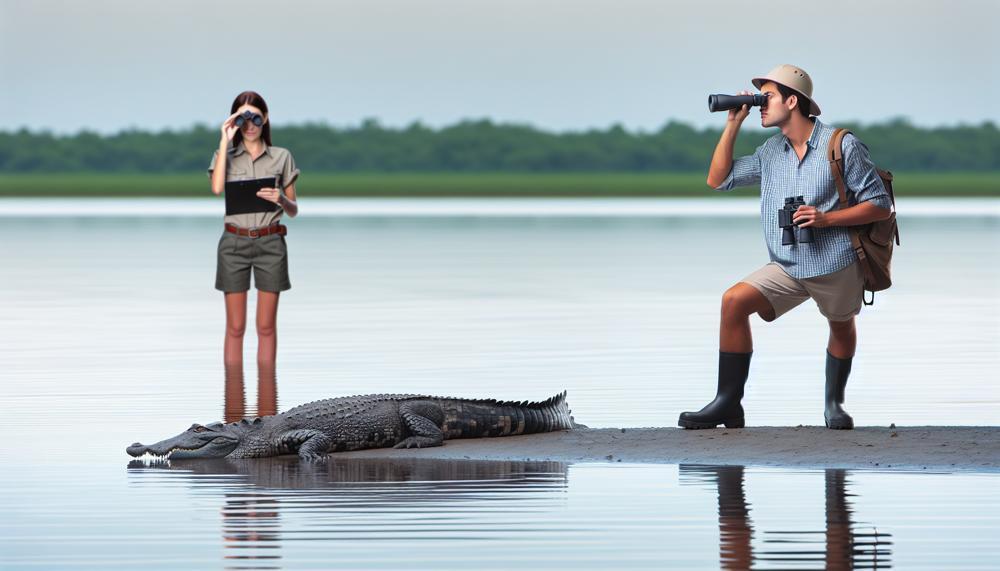Brace yourself for a wild ride as we explore the fierce and ancient world of crocodiles.
These formidable predators have roamed our planet for millions of years. They honed their hunting skills to perfection.
But don’t let their slow-moving appearance fool you – once they’re in the water, they become lightning-fast killing machines.
And unfortunately, humans are not exempt from their deadly attacks.
Every year, there are numerous reports of crocodile-human encounters. Some end in tragic fatalities.
But what drives these creatures to see us as potential prey?
How do they choose their victims?
And most importantly, how can we protect ourselves when venturing into their territory?

Join me on this journey as we uncover the truth behind crocodiles’ appetite for humans.
Contents
Are Alligators Dangerous?
Alligators are generally not considered a major threat to humans.
However, they can become dangerous if provoked or threatened. Crocodiles have a much stronger bite force and are more aggressive towards humans.
Alligators are less likely to attack.
| Size | Danger Level | Notes |
| Less than 4 feet | Low | Rare unprovoked attacks |
| 4-6 feet | Moderate | Potentially fatal if not treated promptly and properly |
| More than 6 feet | High | Serious injury or death likely |
In the United States, alligator attacks are rare, with an average of only six fatal attacks per year. In contrast, crocodile attacks are much more common and deadly. An estimated 100 times more deaths are caused by crocodile attacks than shark attacks.
One reason for this difference is the nature of crocodiles as opportunistic hunters. They can view humans as prey and attack on both land and in water, using their speed and ambush tactics to catch their victims. Additionally, their stronger bite force makes them more deadly predators.
Overall, while alligators can pose a potential danger to humans, the likelihood of being attacked is low. However, it is important to always exercise caution around these animals. Avoid provoking them in their natural habitat.
Do Alligators Eat Humans?
Despite some evidence of alligators attacking and eating humans, these occurrences are not common. Alligators typically prey on smaller animals and tend to fear humans. To avoid an alligator attack, show respect for their habitats. Exercise caution near bodies of water.
In fact, there have been several documented cases of alligator attacks on humans throughout history. In Florida, a young boy was playing near a lake. Suddenly, an alligator attacked him. The boy’s father quickly jumped into the water. He wrestled the alligator until it released his son. Fortunately, both the boy and his father survived the attack.
While these instances are certainly terrifying, they are not a common occurrence. Alligators are not usually aggressive towards humans. They will only attack if they feel threatened or mistake a human for prey. This is why it is crucial to show respect for their habitats and to be cautious when near bodies of water.
For example, if you are visiting an area known for alligators, it is important to follow any posted warnings or guidelines. These may include staying a safe distance away from the water’s edge. You may also want to avoid certain areas altogether. It is also important to keep a close eye on children and pets. They may unknowingly wander too close to an alligator’s territory.
It is crucial to never feed alligators. Feeding alligators can make them lose their natural fear of humans. They become more likely to approach for food. Even throwing small scraps into the water can lead to dangerous encounters with these powerful predators.
Are Alligators Aggressive?
Alligators, the apex predators of freshwater sources in the southeastern United States, are not typically aggressive towards humans. However, they can exhibit aggressive behavior when provoked or feel threatened.
This behavior reflects their natural instinct to protect themselves and their territories. Factors such as their habitat, human encroachment, and food availability influence these instincts.
As cold-blooded reptiles, alligators are most active during the day and use ambush tactics to hunt prey. With their exceptional sense of hearing and keen eyesight, they can quickly detect potential threats or prey in their surroundings.
Territoriality is a significant factor in alligator aggression towards humans. During mating season (April-June), males fiercely compete for territory. Females aggressively defend their nests and young. Alligators may become aggressive if they feel their territory or offspring are threatened.
Human encroachment on alligator habitats contributes to their aggressive behavior. This is another factor. As human populations continue to grow, they expand into areas where alligators reside. Encounters between the two species become more frequent.
In such situations, alligators may feel threatened or have limited access to food sources. This can lead them to exhibit aggression towards humans as a means of survival.
Misconceptions about alligator behavior can also put individuals at risk. Many people believe that alligators are slow-moving or only attack when hungry. However, these assumptions are incorrect. These powerful predators can lead to dangerous situations. People should exercise caution around them.
How to Survive an Alligator Attack?
| Avoid alligator-prone areas: | Be mindful of your surroundings and stay away from ponds, marshes, lakes, and rivers in areas known for alligator activity, particularly at night when they are most active. |
| Back away slowly: | If you happen to spot an alligator, slowly move away until you are at a safe distance. Do not turn your back on the alligator or try to run away as this can trigger an attack. |
| Run in a straight line: | If an alligator starts moving towards you, quickly run away in a straight line. Keep in mind that alligators are faster in water than on land, so try to reach safety on land as soon as possible. |
| Fight back if attacked: | In the unlikely event of an attack, do not attempt to pry the alligator’s jaws open. Instead, fight back aggressively by striking its snout or aiming for its eyes. This may cause the alligator to let go and retreat. |
| Roll with the alligator: | If you are grabbed by an alligator, try to roll with it as it twists and turns in an attempt to disorient you. This will make it more challenging for the alligator to hold onto you and may give you a chance to escape. |
| Do not play dead: | Contrary to popular belief, playing dead during an alligator attack is not effective and may even result in death. Alligators often see their prey as weak or injured animals and will continue their attack. |
Surviving an alligator attack requires caution and quick thinking. Make sure to avoid risky situations and stay alert when in alligator-prone areas.
If you do come across an alligator, remain calm and follow these tactics for the best chance at survival.
Also Read: How Many Teeth Do Saltwater Crocodiles Have?
Conclusion
In conclusion, the world of crocodiles is primal and unyielding. These formidable creatures have ruled our planet for millions of years. Despite their seemingly slow movements on land, they transform into fast killers in the water.
Tragically, humans are not immune to their deadly attacks. We see numerous reports of crocodile-human encounters every year. But what drives these ancient predators to view us as potential prey? And how can we protect ourselves when venturing into their territory?
Through this journey, we have uncovered the truth behind crocodiles’ appetite for humans. We have also learned that, generally, alligators are not considered a major threat to humans. However, they can become dangerous if provoked or threatened.
However, crocodiles have a much stronger bite force and are more aggressive towards humans than alligators. Therefore, alligators are less likely to attack.
We also looked at the factors that make alligators aggressive towards humans. Factors include territoriality and human encroachment on their habitats.
Most importantly, we discovered crucial tips on how to survive an alligator attack. We learned to avoid risky situations and stay vigilant in alligator-prone areas.
Overall, it is paramount to show reverence for these mighty predators. Exercise caution when near bodies of water.






